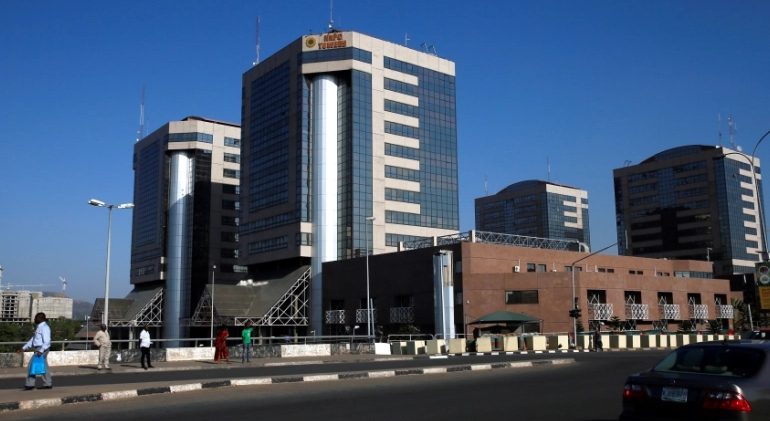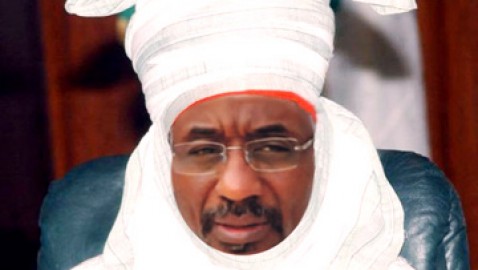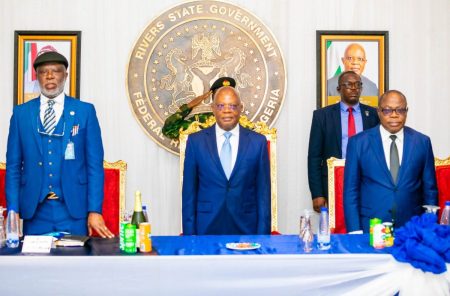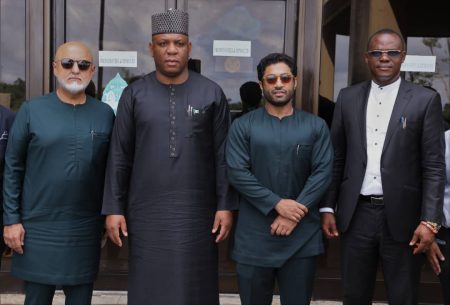*Observers fault reluctance in remitting to Federatio *Subsidiaries generate billions annually *NNPC world’s most opaque firm – Sanusi

Chuks Isiwu
Lagos — When former governor of the Central Bank of Nigeria, CBN, Sanusi Lamido Sanusi, recently described the Nigerian National Petroleum Company Limited, NNPC, as “the most opaque oil company in the world”, he only re-echoed the long-held belief of many oil and gas industry watchers.
Speaking on the problem of inadequate foreign exchange confronting the country at an event in December, Sanusi, who is also a former emir of Kanor, said the lack of transparency and accountability at the NNPC was an issue the nation must address, adding that it was the fundamental reason enough money was not flowing into the national coffers.
The former Central Bank of Nigeria governor, specifically, harped on the lack of transparency in the oil production process and on the revenue accruing therefrom, noting, for instance, that information on these were not available to the Ministry of Finance or the supervising minister, whereas this should not be the case.
“We need to shine light on the NNPC. The Finance Minister cannot tell you that today, this is how many barrels of oil we produce and export. He can only rely on NNPC telling him. Those barrels are revenue. They belong to finance. We have been talking about this for ten years. We need a metering system. The Finance Ministry needs to know how much oil we are producing every day, how much oil we are selling and where the money is going,”
In a related development, the Socio-Economic Rights and Accountability Project, SERAP, recently dragged NNPC Ltd to a Federal High Court in Abuja over the failure of the company to disclose details of Nigeria’s oil production, export and revenue as well as specifics of fuel subsidy payments over the years.
SERAP in the suit number FHC/ABJ/CS/1719/2023 is also seeking an order of mandamus to compel NNPC to disclose details of barrels of oil Nigeria produced and exported daily, and the total amount of revenue generated since the removal of subsidy on petrol in 2023.
Besides the actions by Sanusi and SERAP, the NNPC has continued to come under blistering attacks for lack of transparency and for its opaque nature, with experts and observers asking questions as to where the revenue accruing to the national oil company goes.
“NNPC represents the Federal Government of Nigeria in joint ventures with the international oil companies (IOCs). It (NNPC) is also the arrowhead for Nigeria in other arrangements involving the production of the nation’s oil and gas. When oil is produced, the IOCs collect their share and NNPC takes Nigeria’s share. The assumption, or rather the reality, is that NNPC sells Nigeria’s share of the oil in the international market,” an oil and gas industry player, who pleaded anonymity, explained in a telephone chat with SweetcredeReports.
He continued: “Where the money NNPC makes from these sales go to, is often the issue. The money is supposed to go to the Federation Account, but NNPC sometimes holds back the money, which is why we often hear the Federal Account Allocation Committee (FAAC) accusing the company of not making remittances. If NNPC is not making remittances from the oil sales to the Federal Government, the question needs to asked, what does it do with the money and where does the money go to?”
NNPC was established in 1977 as a state-owned oil corporation and the largest asset holder in Nigeria’s oil and gas industry. It is currently a commercialised company, following the coming of the Petroleum Industry Act, PIA, in August 2021 under former President Muhammadu Buhari.
NNPC subsidiaries
Besides representing the Federal Government in the oil and gas production arrangements, the NNPC has several subsidiary companies that, on their own, are engaged in profitable ventures through which they bring in substantial revenues to NNPC’s central vault. These companies include NNPC Exploration and Production Limited, NEPL, the upstream arm of the national oil company; NNPC Retail Limited, which operates chains of petroleum products sales outlets across the country; and NNPC Trading Limited, a downstream company involved in the distribution of petroleum products.
There are also NNPC Upstream Investment Management Services, NIUMS; NNPC Energy Services Limited, EnServ; NNPC Engineering and Technical Company, NETCO; NNPC Gas Infrastructure Company, NGIC; NNPC Gas Marketing Limited, NGML; NNPC Gas & Power Investment Services, NGPIS; NNPC Shipping Limited, NSL; and NNPC RefChem Limited, NRCL.

Others are Nigerian Pipelines and Storage Company Limited, NPSC; National Energy Reserve Management Company, NERMC; NNPC Non-Energy Investment Services, NNIS; NNPC New Energy Limited, NNEL; and NNPC Foundation Limited/Gte.
Since all these company are involved in profitable businesses, experts also raise questions as to what happens to the revenue they generate into the NNPC central account.
Information available to SweetcrudeReports indicates, for instance, that NNPC Retail generated revenue of N18.4 billion in the first quarter of 2023. It recorded N255.06 billion in the third quarter of 2022. The company’s profit as at the same third quarter of 2022 was N14.14 billion.
NNPC E & P Limited, on its part, generated N747 billion in 2021 while NNPC Trading Limited, operating under its former name – Pipelines and Products Marketing Company, PPMC – grew its profit by 261 percent to N12.95 billion in 2021, from N3.59 billion in 2020, This is according to data released by the NNPC Downstream Directorate in Abuja.
Zero remittances to FAAC
But, perhaps the greater question on NNPC accountability is in terms of its relationship with the FAAC. Rather than release its revenues into the Federal Government-controlled Federation Account, FA, NNPC often withholds the revenue, leading to situations whereby it makes zero remittances to the FA in some months.
For 18 months prior to June 2023, for instance, the NNPC consecutively failed to make remittances to the Federation Account from revenues accruing from the sale of crude oil, claiming it could not make the remittances as it used the funds that could have gone to the Federation Account to cover fuel subsidy. It referred to this as under-recovery or value shortfall resulting from the difference between the landing cost and ex-coastal price of imported premium motor spirit, PMS, otherwise known as petrol.
This also happened in seven consecutive months in 2022. Yet, the NNPC reported a profit of N2.548 trillion in 2022, which it described as the highest profit since its inception.
NNPC eventually remitted N123 billion to the federation account for the month of June 2023. According to its chief financial officer, Umar Ajiya, the N123 billion remitted by the national oil firm comprised N81 billion as monthly interim dividend and N42 billion as 40 per cent production sharing contract, PSC, profit oil; in addition to compliance on payment of royalties and taxes, in line with the provisions of the Petroleum industry Act 2021.
Speaking in November 2023, when he led a delegation from the NNPC on a visit to the Senate President, Senator Godswill Akpabio, at the National Assembly in Abuja, the Group Chief Executive Officer of the NNPC, Mele Kyari, said the company was expecting over N2 trillion in profit. He stated that with the coming of the Petroleum Industry Act, NNPC’s profitability margins had significantly risen, growing from a loss position of N803 billion in 2018 to a profit position of N674 billion in 2021.
“There is no doubt about NNPC’s profitability. As the largest asset holder in the Nigerian oil and gas industry, there is no way its profitability won’t be guaranteed,” Chijioke Moneme, an analyst with Paradyme Oil Resources, told SweetcrudeReports.
“If you look at figures released by NNPC itself, they show that it (NNPC) is making money from the subsidiaries and other sources, including royalties and taxes.
“Most of the time we talk about money from crude oil sales and forget that NNPC has several subsidiaries doing quite well on their own and making money, which goes to the NNPC. There is so much focus on the crude oil earnings. We need to know where the monies from the subsidiaries are going even as we continue to ask questions on why NNPC will choose not to remit money to the Federation Account,” Moneme said.
Subsidy payments
FAAC last year severally accused the NNPC of short-changing it by refusing to remit over N2 trillion to the federation account, with NNPC claiming the Federal Government was owing it over N4 trillion in subsidy payment, power debt and charges from other sources.
NNPC claimed that as of August 2022, it had paid a cumulative N2.04 trillion on fuel subsidy in 7 months.
It stated that in January, February and March 2022, petrol subsidy payments amounted to N210.38 billion, N219.78 billion, and N245.77 billion, respectively, while in April, May and June, they stood at N271 billion, N327.07 billion and N319.18 billion, respectively.
“The sum of N400,469,663,160.14 was the gross domestic crude oil and gas revenue for the month of July 2022.
“The Value Shortfall on the importation of PMS recovered from July 2022 proceeds is N448,782,119,154.91 while the outstanding balance carried forward is N1,044,514,420,619.73,” NNPC said in a presentation to FAAC.
Instructively, at the time NNPC was claiming value shortfall and zero remittance to the Federation Account, the country had the potential to boost revenue with the average oil price at $111 per barrel and daily oil production at 1.08 million barrels.
Observers fault the NNPC over failure to remit funds to the Federation Account over claims of using all its earnings to settle subsidy payments. A source, who pleaded anonymity, wondered whether the national oil firm was in business to only fund subsidy payments, arguing that this cannot be the case as it is obvious that the company is making much more money than what it spends on subsidy.
“NNPC can’t be using all its earnings to pay for subsidy. It is not possible. Granted it may have overhead costs that it attends to, still this would not make it impossible for it to remit funds to the Federation Account. NNPC certainly has a lot of explanation to do on this,” the source stated.
NNPC world’s most opaque firm – Sanusi
For the former CBN governor Sanusi, it is worrisome that even with President Bola Tinubu’s declaration of fuel subsidy over on his inauguration on May 29 last year, NNPC is still not making funds available to the Federation Account.

He said: “We paid N11 trillion in fuel subsidy. There is no accountability up till now. The National Assembly called NNPC to bring the documents, they refused.”
“We are no longer paying subsidy. So, where are the dollars. Before, it was under-recovery. Now we don’t have under-recovery. So, where is the money?
“This was the issue I raised for which I was suspended. But it is an issue that this country must address. NNPC is the most opaque oil company in the world. When I was in the Central Bank, for 15 years, they have not been audited,” Sanusi said as he emphasised that the nation cannot afford to be producing crude oil without seeing the revenue.
“You need to follow the money. This is the number one priority – follow the money, from production to exports to return. Where is the money going?” he stressed.
Alluding to leakages in the system, the former emir of Kano noted that if the nation doesn’t fix the leakages, the problem of inadequate foreign exchange cannot be addressed. “If you don’t fix the leakages in the system, if you don’t fix the dollar revenue issue, you will never fix exchange rate problem,” he added.
As part of measures to plug the leakages, Sanusi suggested the appointment of a substantive minister for the Petroleum Ministry outside the president, who currently holds the portfolio. He said: “Let me advise that this idea of the president being the petroleum minister is not a good idea.
“The last president was minister of petroleum for 8 years. When I was governor of the central bank, we had a petroleum minister, so, when I talk about NNPC, I could attack Diezani (Alison-Madueke). Now, nobody can talk about petroleum because if you talk, you are attacking the president.
“We need that buffer. A minister has to be there, who is held actable by Nigerians.”
Nigerians have right to know oil produce, revenue realised – SERAP
SERAP’s Deputy Director, Mr Kolawole Oluwadare, told SweetcrudeReports that in suing the NNPC at the Federal High Court in Abuja, SEAP, as Nigerians, have the right to know the volume of oil the country produces and exports daily as well as the revenue generated and remitted to the public treasury.
He said: “SERAP wants an order of mandamus to compel the NNPC to disclose how much of the revenues generated from the production and exportation of oil have been remitted to the public treasury, including since the removal of subsidy on petrol.
“SERAP is also asking for an order of mandamus to direct and compel the NNPC to disclose details of payment of N11 trillion made as subsidy payments from 1999 to May 2023, including a detailed breakdown of the payments made.
“There is a legitimate public interest in disclosing the information sought. The NNPC has a legal responsibility to disclose the details of Nigeria’s daily oil production, exportation, and the revenues generated and remitted.
“The failure by the NNPC to disclose the information sought is a grave violation of the provisions of the Nigerian Constitution 1999 (as amended), the Freedom of Information Act, and the country’s obligations under the African Charter on Human and Peoples’ Rights.”



